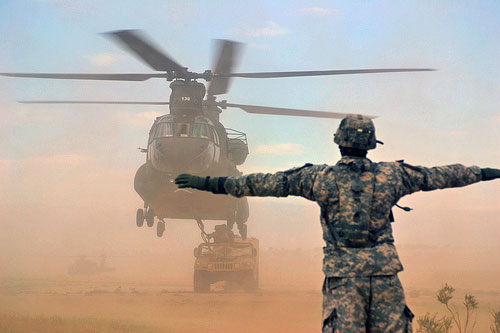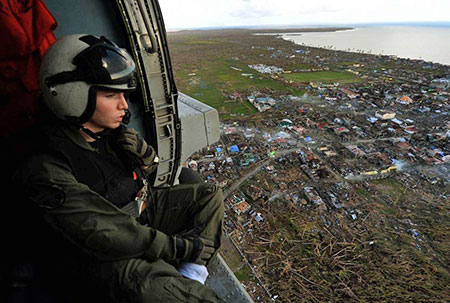|
-

by Tom Revell
May 14, 2014
from
BlueAndGreenTomorrow Website

Climate change is already acting as
a catalyst for conflict
and poses a serious risk to security,
according to a strongly worded "call
for action"
from a panel of
former American generals and admirals.
The Center for Naval Analysis
Corporation’s (CNA)
Military Advisory Board
report concludes that the impacts
of climate change are increasing instability around the world, even
in the Arctic.
It suggests that droughts caused by
warming in the Middle East and Africa are leading to conflicts over
food and water, exacerbating pre-existing tensions and creating an
environment in which extremism and revolutionary influences can
prosper.
In other regions, rising sea levels will
create millions of new refugees and migrants, while increasingly
frequent extreme whether events are expected to stretch the US
military.
Meanwhile, in the
melting Arctic nations will compete
to exploit newly accessible resources, threatening not just the
environment but also security.
Overall, the report upgrades climate
change from a "threat multiplier"
- as it was labeled in CNA’s 2007 report and a recent
Department of Defense review - to a
catalyst for conflict.
"Political posturing and budgetary woes cannot be
allowed to inhibit discussion and debate over what so many
believe to be a salient national security concern for our
nation," the report’s authors say.
"Time
and tide wait for no one."
In a foreword, former US secretary
of homeland security Michael Chertoff and former secretary of
defence Leon Panetta say the report serves as "a
bipartisan call for action."
In an interview with the New
York Times, the US secretary of State John Kerry said
that the report would influence America’s foreign policy.
"Tribes are killing each other over water today,"
he said.
"Think of what happens if you have massive
dislocation, or the drying up of the waters of the Nile, of the
major rivers in China and India. The intelligence community
takes it seriously, and it’s translated into action."
Here is Why U.S. Military Thinks Climate
Change is...
National Security Threat
by Susanne
Posel
May 15, 2014
from
OccupyCorporatism Website

The Center for Naval Analyses Military Advisory Board (CNA-MAB)
released a report
co-authored by several retired generals concerning the "national security"¯ threat climate change is to the environment.
Authors of the study assert,
"the biggest change in the seven years between the two studies was the increase in scientific certainty about global warming, and of the link between global warming and security
disruptions."¯
Climate change, according to this document, becomes
a "threat multiplier"¯ which could,
"enhance or contribute to already existing causes of global
disruption."¯
Retired Air Force General Charles Wald
said:
“In the past, the thinking was that climate change multiplied the significance of a situation. Now we’re saying it’s going to be a direct cause of instability.”
The report states:
"Climate change can act as a threat multiplier for instability in some of the most volatile regions of the world, and it presents significant national security challenges for the United States. [Problems will be felt] even in stable
regions."¯
Authors of the report claim that the US military,
"should plan to help manage catastrophes and conflicts both domestically and internationally, raising concerns regarding a wave of refugees fleeing rising sea levels.
These effects are threat multipliers that will aggravate stressors abroad, such as poverty, environmental degradation, political instability and social tensions
- conditions that can enable terrorist activity and other forms of
violence."¯
The CNA-MAB asserts that US lawmakers must respond
because "the increasing risks from climate change "will almost certainly get worse if we
delay."¯
This report states the climate change
has and will continue to cause drought in the Middle East and
Africa,
"leading to conflicts over food and water and escalating longstanding regional and ethnic tensions into violent
clashes."¯
Another concern of the authors is the,
"rising sea levels [that] are "putting people and food supplies in vulnerable coastal regions like eastern India, Bangladesh and the Mekong Delta in Vietnam at risk and could lead to a new wave of
refugees."¯
John Kerry, Secretary of State remarked:
“Tribes are killing each other over water today,” Kerry said.
“Think of what happens if you have massive dislocation, or the drying up of the waters of the Nile, of the major rivers in China and India. The intelligence community takes it seriously, and it’s translated into action.”
Kerry believes that this report will influence US foreign policy in the future.
In accord, John Conger, deputy undersecretary of defense for installations and environment with the Pentagon explained:
“The department certainly agrees that climate change is having an impact on national security, whether by increasing global instability, by opening the Arctic or by increasing sea level and storm surge near our coastal installations.
We are actively integrating climate considerations across the full spectrum of our activities to ensure a ready and resilient force.”
Last March, Admiral Samuel J. Locklear, commander of the US Navy Pacific operations sector, voiced
concern that man-made climate change is a real and viable threat to US national security with regard to possible nuclear engagement with North Korea and the mounting observations of
China's detriment to the US in general.
Locklear commented that global warming has the potential to,
“cripple the security environment, probably more likely than the other scenarios we all often talk about. You have the real potential here in the not-too-distant future of nations displaced by rising sea level.”
The
US Navy Energy, Environment and Climate Change task force (TFCC)
was created in 2009,
"to address the naval implications of a changing Arctic and global
environment."¯
The TFCC is empowered to,
"make recommendations to Navy leadership regarding policy, investment, and action, and to lead public discussion on this serious
issue."¯
While the TFCC is concerned about Arctic ice melt, sea levels,
resource
"challenges"¯ and "humanitarian assistance"¯ with regard to "disaster response"¯, they consider the effects of,
"ocean acidification on ecosystems, abrupt climate change, and geo-engineering
challenges."¯
The
document
entitled, "US Navy Arctic Roadmap"¯ outlines how the US Navy policy assists in
governing,
"investment, action, and public discussion regarding the Arctic; capitalizes on the
Navy's extensive experience in the region; and emphasizes cooperative partnerships in joint surveys, research, search and rescue, Maritime Domain Awareness, and incident
response."¯

Rajendra
Pachauri
Rajendra Pachauri, chairman of the UN's
Intergovernmental panel on Climate Change (IPCC) retorts that if a successful action is not taken to stop climate change, it will become a national and international security threat.
Pachauri said:
"If the impact of climate change is going to make regions of violence poorer, then they really provide a level of fertility for inciting disaffection, resentment against the prosperous world.
That's an indirect effect that can create the conditions for
terrorism."¯
Recommendations to the US were:
"We're likely to have problems with respect to water supplies in the US. We have to tell the people of the US. That this is something intimately connected with their present and their future.
The cost of inaction is going to be far higher than action. And the cost of action is really not all that high. The US has made all kinds of sacrifices in the past and has always come out on
top."
|



